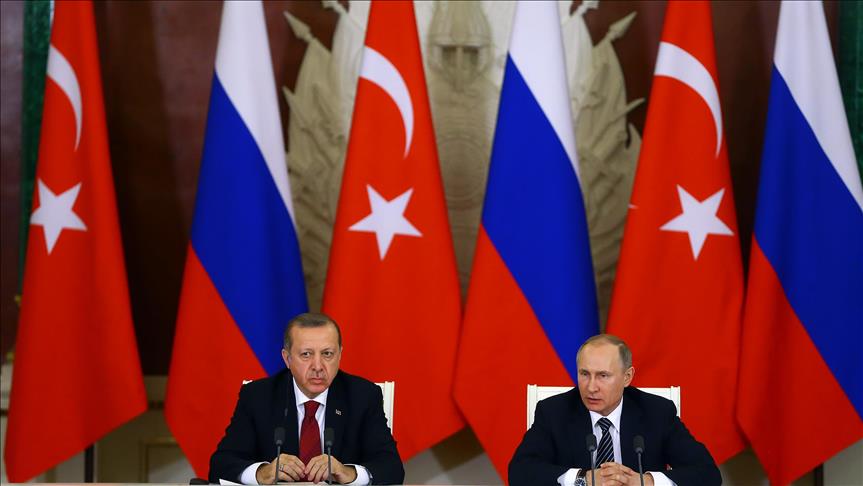Ankara, Moscow agree to ease ban on Turkish firms
Russia will remove work permit sanctions against Turkey as soon as possible, Putin says

Ankara
By Diyar Guldogan
ANKARA
Turkish President Recep Tayyip Erdogan and his Russian counterpart Vladimir Putin agreed Friday to remove work permit sanctions against Turkish nationals and businesses.
"We expect Russia to completely remove [economic] restrictions," Erdogan said at a news conference with Putin in Moscow.
"Only in this way will it be possible for us to reach our previously announced target of $100 billion trade volume."
Putin, for his part, said that Russia would "very soon" remove work permit sanctions against Turkey.
"Erdogan raised this issue today," he said, adding they especially discussed the situation of the Turkish workers in construction sector.
"We agreed on the date when this [sanction] will be removed. This ban will be lifted as soon as possible," Putin said.
He added technical issues remained in this regard, saying: "We will continue to solve other issues."
The last meeting between Erdogan and Putin was held last August after Turkey and Russia patched up the fallout from the downing of a Russian jet over the Turkish-Syrian border in November 2015.
After the Nov. 24, 2015 jet crisis, Moscow took several measures against Turkey, including restriction of visa-free travel to a ban on imports of certain foodstuffs and a ban on the sale of Turkish holiday packages by tourist agencies to Russians. Russia had also called on its nationals to boycott Turkey as a tourist destination following the crisis.
Since last summer, Russia has relaxed the sanctions imposed on Turkey in response to the jet incident and the countries have worked together to bring a cease-fire and political solution to Syria.
Relations were tested in December when the Russian ambassador in Ankara, Andrey Karlov, was assassinated in the Turkish capital. However, Putin declared the shooting a “provocation” designed to undermine Turkey-Russia relations.
Syria
Erdogan also commented on the situation in Syria, saying "No one should endanger Syria's territorial integrity and national unity. With Russia, we will continue our efforts to find a solution to the [Syrian] problem on the basis of justice and equity."
He noted that although Turkey and Russia did not agree on everything, the countries kept the channels of communication "open".
Putin said Syria's territorial integrity was an "irreplaceable" element, which is "vital" for the solution of the crisis.
He added the situation in Syria was "complicated".
Erdogan reiterated Turkey considered PYD, YPG, al-Nusra and particularly Daesh as terrorist organizations.
Putin said Russia was "determined" to jointly fight against Daesh.
About the northern Syrian city of Manbij, Erdogan said: "...we, as Turkey and Russia, want to cooperate with the coalition forces there."
Manbij, an Arab-populated city on the western bank of the Euphrates River, is currently controlled by the PYD forces, which Turkey regards as a terror group and an offshoot of the PKK which Ankara has been fighting for several decades.
Turkey has insisted PYD elements must leave Manbij and withdraw east of the Euphrates.
Erdogan added "close" cooperation with Russia on regional stability and global peace may "disturb some people", saying: "However, we will not be provoked and allow terrorist organizations to poison our relations."
High-level meeting
Following the sixth High-Level Cooperation Council between Russia and Turkey on Friday, the two countries signed eight agreements in trade, economy, science and culture.
Erdogan and Putin agreed on holding next year's high-level meeting in Turkey.








